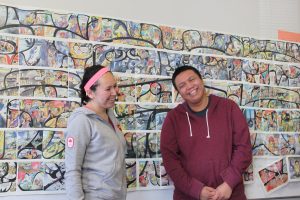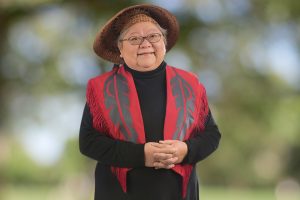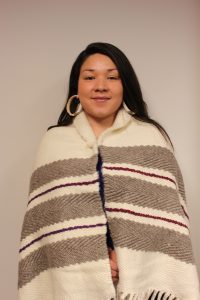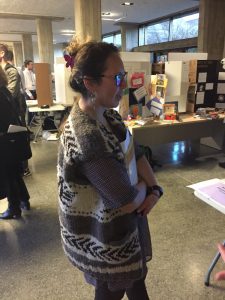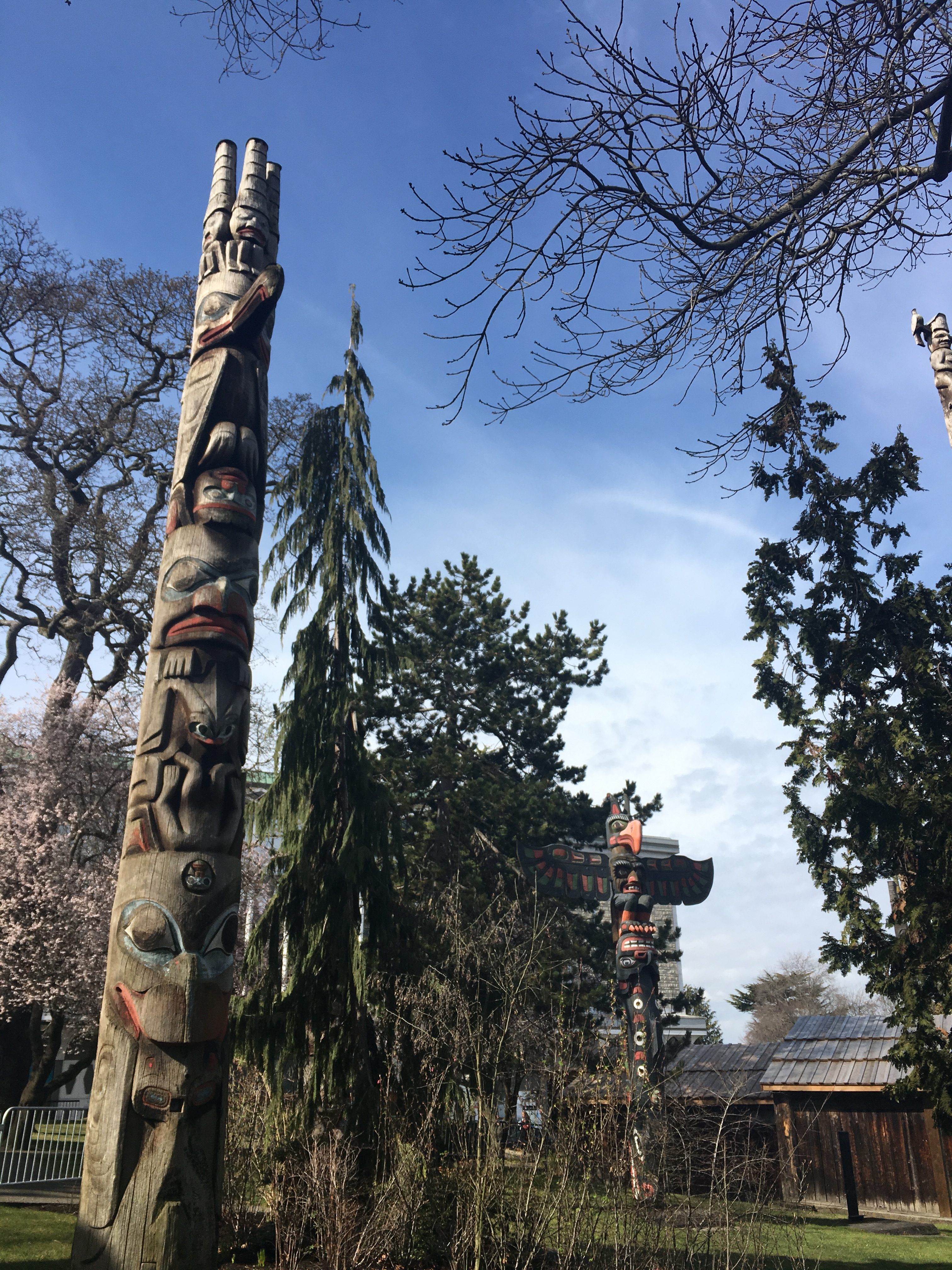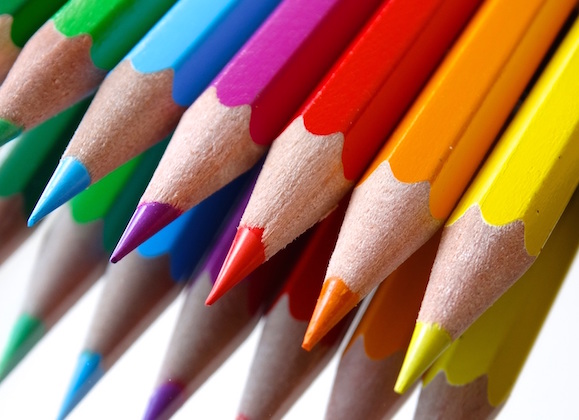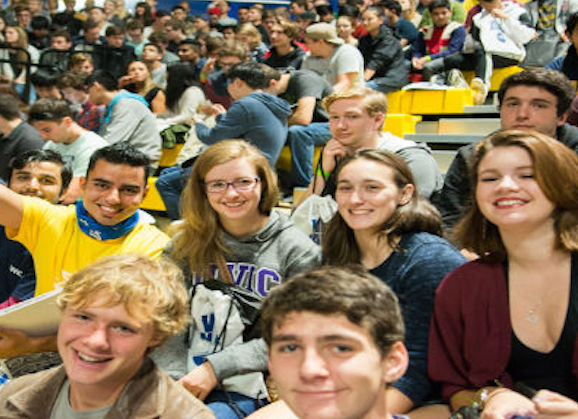The Speaking Land: UVic’s Indigenous Language Revitalization Programs
I come from a place of ignorance. I don’t say this lightly, but I realised partway through my education first at Camosun, and then at UVic, how little I know and understand about First Nations culture, despite living in Canada most of my life, and just how remiss my high school education had been.
 I was fortunate to have professors in post-secondary who took time to explore some aspects of Indigenous culture and its links to the land. The biggest impression was made by an Indigenous marine biologist, who shared the stories of his culture, the land, and the need to honour and protect it.
I was fortunate to have professors in post-secondary who took time to explore some aspects of Indigenous culture and its links to the land. The biggest impression was made by an Indigenous marine biologist, who shared the stories of his culture, the land, and the need to honour and protect it.
As a literature student, I know that stories are important, and as a history student, I know that stories and history are inseparable, each influencing the other. While history teaches us facts, we can sometimes dismiss it as biased, or dull (although I disagree about the dull part!).
Stories tell us about feelings, beliefs, culture, and societies that we have not, or cannot, experience through the stories’ powers of description and emotion. It is through these things that we can create cultural understanding, something far greater than the inadequacy of tolerance. It was through the stories of the Salish people that I found I could relate, and therefore understand, finding more commonality than difference in the tales I heard to my own Anglo Saxon and Celtic roots.
Curiosity led me to speak to my soccer teammate, Jo Henry, whom I knew was currently doing her teaching certification in her own language of SENĆOTEN, a language she did not speak, but her grandparents did.
When Jo applied to UVic, she knew a little of the Cowichan language, while her nieces and nephews had started in kindergarten in the newly implemented immersion program (now overflowing!) at the ȽÁU,WELṈEW̱ Tribal School. Now in Grade 5, they were able to speak in their own language with their great grandparents. Jo saw a generational gap, which she decided to fill.
So why were these languages on the verge of disappearing? Why the gap that Jo described?
Imagine that you are told that you can no longer communicate in your language, that you must now communicate through a foreign language that you don’t speak. As a writer, words are everything for my craft, but they are also my identity; they are how I communicate with the world at large, how I understand my environment, and how I teach my culture to my kids and share it with those of common ancestry, and with those who are interested. It would be horrific to be denied this basic ability to convey my thoughts and, therefore, the meaning I find in life.
Sadly, this is exactly what happened at the residential schools.
When I had the privilege to speak with Lorna Williams, the retired Professor Emeritus from UVic, she showed her continued passion and commitment for UVic’s language revitalisation program that she was instrumental in beginning. As a residential school survivor, her language had been taken from her as she was expected to be monolingual: English only. Lorna had to relearn her own language as an adult when she realised that something had been taken from her. Not satisfied with just that, she took action.
Lorna’s list of accomplishments is impressive, not least of which is that she was co-designer and developer of three degree programs at UVic, collaborating with Indigenous communities: the BA and the MA in Indigenous Language Revitalization, and the Counselling in Indigenous Communities MA. Read this Ring article about her many accomplishments.
Her voice was vital in getting all teacher education programs in B.C. to include an Indigenous component in their courses. Currently, she is working with the Ministry of Education on an Indigenous language policy which will be implemented in all schools in B.C. in the future. Lorna believes that change has come for the better, driven by the younger generations who are more widely travelled, more inquisitive, pushing for change.
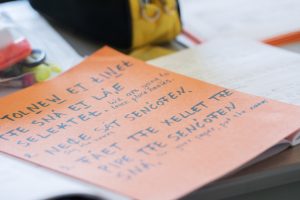 Much more is lost through the eradication of a language than I ever considered, as Lorna explained: we gain understanding about a people through understanding their language. We also learn what they understand about themselves.
Much more is lost through the eradication of a language than I ever considered, as Lorna explained: we gain understanding about a people through understanding their language. We also learn what they understand about themselves.
For a people so connected to the environment, knowledge is shaped because of the land in which the language is born through the deep relationship with the earth within the language. It is only through understanding the language, keeping it alive, that culture can truly be preserved.
Jo Henry spoke of the identity found in her language, the pride of those who were able to speak it, and able to share their knowledge, the empowerment it brings. She talked about teaching and learning being sacred in her culture, something sadly lacking in my own. Jo is a quiet, thoughtful person, the pride in her people evident in her voice, her passion to carry this forward, to give this gift to future generations, truly awesome.
Lorna spoke of UVic’s early linguistics program and the impact this has had on getting this issue nationally recognised. It has not been an easy road. Lorna welcomed me into her home, answering my questions matter-of-factly, explaining the arduous journey she has undertaken to see this through, not as if it was a chore, but as a calling or vocation. Her commitment has been astounding.
There are certainly challenges. First speakers of many Indigenous languages are dying out. One of the last fluent speakers of the Dakelh language died recently. Her name was Mary Gouchie, and her death presents a challenge as she “took a whole dictionary with her,” meaning that this language is partly lost. Forever.
There are eleven Indigenous language families in Canada, eight of those in BC alone. To put this in perspective there are only three language families in Europe. Three. In BC there are thirty-six languages, and countless dialects. I thought this overwhelming, but Lorna is undaunted, explaining that there are enough similarities to make it work. There are also enough people who value this, but more importantly, there is a burgeoning understanding cross-culturally to see the importance in saving these languages and the cultures they are linked to.
One of the best ways of to preserve a language is in written form, which presents its own problems with unwritten languages. Lorna hails from Mt. Currie, where, in 1973, Lorna’s community took over the administration of their school from the federal government. It was the first school in BC to implement teaching in their cultural language, a program that was aided by a linguistics student from Lyndon University who helped to develop a curriculum from preschool through to adult, while the community taught the student about how to live in their culture, a mutually beneficial relationship.
This led to the development of a written form of the language to document the newly created curriculum. They started with the international phonetic alphabet on an IBM Selectric typewriter. This machine had a “ball” with the characters on it, rather than the traditional hammers in a standard machine. Deciding to change over to the Roman alphabet, a man was found in Hawaii to modify the “ball” to suit the language’s characters. Many of the languages have been documented in this way, but not all.
Sharing stories
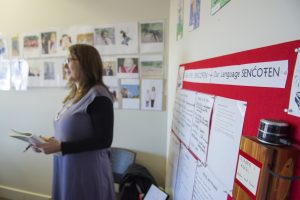 As part of truth and reconciliation, it is paramount that these languages are preserved and grown for the future. The stories they tell are vital to understanding these cultures, but they are most important to the people who live within the cultures, part of identity, spirituality, and cultural pride.
As part of truth and reconciliation, it is paramount that these languages are preserved and grown for the future. The stories they tell are vital to understanding these cultures, but they are most important to the people who live within the cultures, part of identity, spirituality, and cultural pride.
Both Lorna and Jo showed me something that I had not realised about language. Language springs from the land in which it is born. My parents are from Scotland and the North of England, country folk born pre World War II who continued to use unique colloquial terms all their lives, despite good educations and moving to Canada. I had not made the connection between the words and the land where they were formed until speaking to Lorna. Think of the Scottish landscape, and if you can, think of the sound of Gallic being spoken. It fits its home, it sounds like the land.
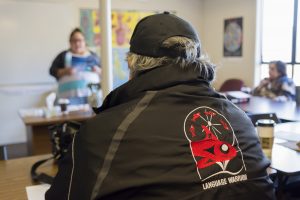 This is truer of the Indigenous languages. With less outside influence, these languages speak of and from the land which provided the words. Hearing Jo describe snow in SENĆOTEN was truly beautiful, the sounds of the words lyrical to my English ear. SENĆOTEN has many words for snow; ĆI,EK, snowing, to be snowing, the act of snowing; NAKE, fallen snow, the snow on the ground; ŚIŚI,KOME,, snow that is swirling into the longhouse (my favourite).
This is truer of the Indigenous languages. With less outside influence, these languages speak of and from the land which provided the words. Hearing Jo describe snow in SENĆOTEN was truly beautiful, the sounds of the words lyrical to my English ear. SENĆOTEN has many words for snow; ĆI,EK, snowing, to be snowing, the act of snowing; NAKE, fallen snow, the snow on the ground; ŚIŚI,KOME,, snow that is swirling into the longhouse (my favourite).
The translation to English is clunky and awkward, my language not connected to this land, but to another. LÁU means to flee or seek rescue, to escape, or it can mean to heal or be healed. ŁÁU,WELNEW refers to a place of refuge, or the place of healing. This is linked to the creation story in which there were men who tried to flee the Creator/Transformer. They were transformed into shellfish, one of which is the blue mussel, or ŁAU,KEM. Each of these words starts from the same root, of ŁAU, and has parts or suffixes added to change the meaning (a very simple description).
Empathy comes through shared stories. All cultures need their unique stories to understand themselves. If the ability to express our stories in our culture’s language disappears, we lose our roots, our beliefs, our ties to our land. This is why this program is so very important to the Indigenous people of Canada, and to all Canadians.
Cultural understanding creates true empathy, which promotes change. Our stories are often more similar than different, expressing a shared human experience, whether we are European, African, South American, or Canadian First Nations. Language revitalisation is part of the puzzle of truth and reconciliation, allowing us all to go forward with respect for each other as human beings.
I would like to thank Lorna and Jo for sharing their time, their knowledge, and their passion with me. I learned many things, and have much more to learn. Thank you for being part of this journey.
Learn more about Indigenous language revitalization
SENĆOŦEN Leader MENEŦIYE Elliot Teaches A Forgotten Language To The Next Generation
Dahti Tsetso’s experience in the Indigenous language revitalization program.
Hear Katia Olsen (Bachelor of Education in Indigenous Language Revitalization grad) speak SENĆOTEN and Dr. Trish Rosborough, instructor, speak Kwak’wala on CBC’s Unreserved podcast

